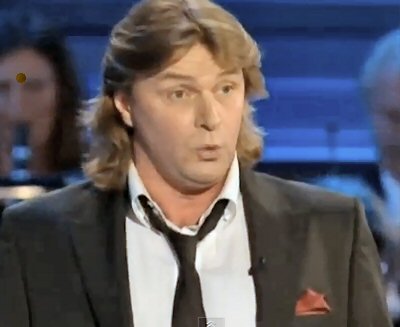Klaus Florian Vogt
Website

In RA format
Wiener Staatsoper:
Die tote Stadt, May 9th, 2008; Lohengrin, May 22nd, 2008
This is a voice not everybody, and perhaps not even many will love... it's really a strange, an
outlandish voice. When I first heard Vogt, I switched on the radio in the middle of the bridal chamber scene
from Lohengrin, and I was sure this was a joke recording, with a contralto singing Lohengrin. Well no, it was
Vogt. I even had the same experience on stage; towards the end of act 2 of Lohengrin, I suddenly thought
"is Ortrud back on stage?", and started looking for her... again, it was Vogt singing!
His voice has the
colour of a Bach oratorio tenor, with a strong share of countertenor timbre, and yet: it's so extraordinarily
large, and so powerful when heard in the theatre, that's like totally unimaginable judging from a recording;
and in spite of all that countertenorial air about it, it has a strong metallic quality at the same time making
Vogt a true heldentenor. I know this doesn't seem to make sense when reading it, and I know it's a weird
description, but then, it's also a weird voice.
His singing, though, is not at all weird; it's simply brillant.
Musicality like Vogt's has been unheard in Wagnerian tenor singing in the lifetime of almost every present-day
opera lover; he has not only a stentorian forte and knows where to use it, but above all an easy and great
piano that he knows where to use, as well. That piano makes him unique in Wagner, not just nowadays;
in fact, I think that since 1939 (the year before Franz Völker lost his voice), no true heldentenor has
ever sung a single piano note like Vogt produces dozens of in every performance.
(Peter Seiffert, before ruining his voice, sang an equally gorgeous Lohengrin, with equally excellent
piani, and with a more beautiful timbre, but he was no heldentenor.) Another feature of his musicality is
his impeccable precision; nowhere any hint of insecurity, no delaying of any cue for even a tenth of a second.
And his German diction is exemplarily clear.
He made great impression in the extremely difficult, high and heroic part of Paul in Die tote Stadt,
with just occasional forced top notes (which is almost a miracle, given Korngold's score being so crazily
hostile to the tenor), and excellent stage acting, as well; and he was actually swept away by the audience's
enthusiasm at the end of his first Vienna Lohengrin. This role is his cheval-de-bataille, and with good
reasons; his voice seems to make sense for that somewhat extraterrestrial creature, and his interpretation
is overwhelmingly secure and spot on; vocal and stage acting combined, he gave a really excellent portrayal
of Lohengrin (yes, even his stage acting was fine, the annoyingly static and nonsensical Staatsoper production
notwithstanding – he's supposed here to primarily sit or stand around without moving, which he fortunately "forgot" to
do regularly enough).
All in all, Vogt is the best heldentenor for the German repertory I've ever heard on stage. Given that he seems to
know which parts his voice is currently suited to (Stolzing, Lohengrin, Parsifal, Siegmund, Florestan, Kaiser
– but not yet Tristan, not yet Siegfried), there's reason to hope that he will continue for many more years
to come.
What a downfall.
Rolando Villazón, the Has-been, introduces and hands Vogt the award "Best Singer of 2012".
Villazón calls Vogt the guy who Wagner had dreamed of. Then Vogt sings another wonderful version of Winterstürme.
Well, I don't find Vogt's Siegmund as bad as Mr. Nouvion did (as I already wrote back in 2008:
this is a voice that not everybody will love), but I divide the "downfall" verdict, because actually, I've heard Vogt far worse
meanwhile than in these two Winterstürme versions. It's been a long time that I don't attend his performances
anymore since I find them unpleasant (increasingly so, as regular radio transmissions reveal).
Vogt values his family highly, which is certainly nice; but it leads him to never staying overnight anywhere in Europe: he
commutes every day. If he sings in Spain, for instance, he will fly back to Germany after the performance
by his own hand, in his own private airplane, have
his motorbike parked at the airport, drive the rest of the night to his neck of the woods, and sit at the breakfast table with
his family. Small wonder that he's been very efficient at ruining his voice in a matter of few years.
Vogt, born 12 April 1970 in Heide/Holstein (he would always continue to live in that region), was originally a horn player
with the Hamburg Philharmonic Orchestra before starting, as a tenor,
in Lübeck in 1996. He sang in Dresden from 1998 to 2003, where he had his first considerable success as Lohengrin. It was
the role that made him famous, and he sang it in many places: other than in Vienna, at the Met, La Scala, Covent Garden, Hamburg,
Berlin, Munich, Zürich, Tokyo – and regularly in Bayreuth, where he had made his debut as Stolzing in 2007, and
where he still (I'm writing this in 2022) sings every year.
|
